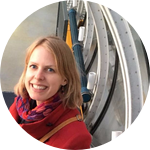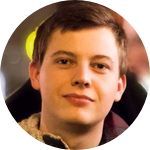About This Project
We use Fluorescence Recovery After Photobleaching (FRAP) to study the impact of cell penetrating peptides (CPPs) on the lateral mobility and diffusion kinetics of membrane incorporated molecules. For efficient data evaluation we developed the R-based open source web browser application Frapbot, which is compatible with all available Internet browsers & thereby independent of any operating system. The app allows manual and automated analysis using a pattern recognition algorithm.
Ask the Scientists
Join The DiscussionWhat is the context of this research?
The understanding of uptake mechanisms of drugs in cells is essential for the development of nanomedicines. Cell penetrating peptides (CPPs) are able to penetrate cell membranes and translocate drug cargoes into cells. We aim to use FRAP to study the impact of CPPs on lateral mobility/diffusion of membrane proteins, a process which we propose may be crucial for successful translocation. To decide which diffusion model describes best a set of FRAP data, repeated curve fitting and data analysis are required. Analysis of a large data set is therefore time-consuming, and interpretation of data is challenging. There is a strong need for automatization of the analysis, independent of any operating system, to efficiently evaluate the big datasets.
What is the significance of this project?
In the age of "Big Data", the development of appropriate software solutions/applications is crucial for the evaluation of scientific data, e.g. to study the uptake mechanisms of drug delivering molecules. Currently, FRAP data processing and analyses are often performed using spread-sheets or commercial software packages, that are not generally available to all researchers and restricted to certain operating systems. Moreover, they often provide only a limited set of functionalities, which are required for correcting, scaling, normalizing and fitting of FRAP data. A platform-independent, free-of-charge open source software web application allows manual and automated analyses of FRAP datasets for researchers, independent of the used operating system and financial budget.
What are the goals of the project?
We aim to understand how CPPs impact the dynamics of membrane proteins to conduct their translocation into cells. To do so we expose living cells to various types of cell penetrating peptides including cationic CPPs and study their impact on lateral mobility and diffusion kinetics of fluorescently labeled cell membrane molecules using FRAP. To accelerate and optimize the analysis, we created the first R-based open source web browser application for automated and manual FRAP evaluation, named Frapbot. The programming language R is widely used in science for data analysis. For automated operation, we developed a pattern recognition algorithm that recognises the relevant aquired parameters and identifies the presence or absence of prebleach values and the time point of photobleaching.
Budget
The campaign will cover the finalization of the Frapbot project as well as the first year of setup/maintenance costs for the platform. The prototype is available via Frapbot.
Endorsed by
 Project Timeline
Project Timeline
Frapbot is already developed as prototype and we hope to finish the front- and back-end issues and the overall optimization of the platform as soon as possible.
Sep 26, 2017
Project Launched
Oct 31, 2017
Front-end development
Nov 30, 2017
Trademark
Dec 31, 2017
Back-end development
Meet the Team
Affiliates
Affiliates
Team Bio
We were awarded with the Google Summer of Code grant 2016 and 2017 for the development of R-based software applications for scientific data analysis.
We want to change the way of data analysis and the implementation of R. By creating and sharing content we hope to enrich the R ecosystem in upcoming years. For more information visit our platform here.
Samuel Schmidt
I performed my Master in Medical Biochemistry in 2007. Thereafter I started my Ph.D. studies at the Radboud Institute for Molecular Life Sciences in Nijmegen, The Netherlands, where I completed my experimental PhD thesis on the impact of cell surface glycosylation on tumor cell migration and invasion in vitro and in vivo. In 2013, I received the prestigious Roche Postdoc Fellowship (RPF) from F. Hoffmann-La Roche Ltd, Basel, Switzerland, and developed a GFP complementation assay to study the transport of functional cell-penetrating peptides (CPPs) from the cell surface to the cytosol with focus on endosomal release. Based on these findings I co-developed and published the peptide prediction software application "Peptify" for instant identification of amino acid combinations that can penetrate the cell membranes. Furthermore, I studied the influence of cell surface glycosylation on the uptake of CPPs. In February 2017 I received the KIC Postdoc Fellowship from the Kavli Institute for Nanoscale Science at Cornell University, USA.
My research was published in numerous high ranking journals and presented on national and international conferences.
I am involved in the development of R codes, which I have co-founded. Furthermore, I am involved in the development of Frapbot, a free-of-charge open source software web application written in R, which provides manual and automated analyses of fluorescence recovery after photobleaching (FRAP) datasets for molecular mobility studies. Frapbot has just been published. Both projects are part of the Vaionex Corporation, a young datascience & biotech startup I have co-founded in 2016.
Find more information about me and my research here.
Robin Kohze
I am Master student in Data Science (R/Python) and Biochemistry. In my first Master internship I have focussed on studying the molecular impact of the cell surface glycocalyx on the uptake of cell penetrating peptides using state-of-the-arts biochemical/biophysical and molecular approaches, e.g. Fluorescence recovery after photobleaching (FRAP), Atomic force spectroscopy (AFS), high resolution live cell confocal microscopy and cytometry. Molecular dynamics (MD) simulation was used to conceptionalize the interaction between glycosaminoglycans and arginine-rich cell-penetrating peptides. I was involved in the development of the peptide prediction application "Peptify", which was developed and published in cooperation with Hoffmann-La Roche, Basel, one of the top 10 pharmaceutical companies. I developed a new open source Fluorescence Recovery After Photobleaching (FRAP) application, named Frapbot, which has just been published. I am co-founder of the Vaionex Corporation, a young datascience & biotech startup. At the moment, I am performing my second Master internship at the University of Cambridge, Cambridge Centre for Proteomics, Computational Proteomics Unit (Laurent Gatto group) aiming to develop a new infrastructure to facilitate the dissemination of spatial proteomics data.
Find more information about my work here.
Project Backers
- 4Backers
- 4%Funded
- $69Total Donations
- $17.25Average Donation




